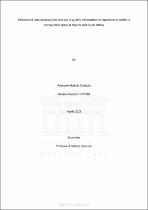| dc.description.abstract | In healthcare settings, information systems play a critical role in providing safe, timely, and effective healthcare services. Decision-making on medical supplies, healthcare providers, service delivery, finance, and governance all depend on access to health information. To improve overall health services and processes, these information systems manage data collection, processing, storage, retrieval, and utilisation. The effectiveness of health systems depends on effective administration and data quality. Irrespective of the significance of health information systems, many low- and middle-income nations, such as South Africa and Nigeria, continue to encounter challenges with data accuracy and the use of high-quality information. Inaccurate data can lead to misinformed policy decisions and resource allocation, hindering efforts to improve reproductive health outcomes. Problems such as incomplete, outdated, unreported data, poor integration, and underutilisation of technology affect data quality and completeness. Data quality impacts decision-making, performance, and the ability to achieve national and international health goals. Government involvement and suitable policies are crucial for addressing these challenges and improving the effectiveness of health information systems. | en_US |

